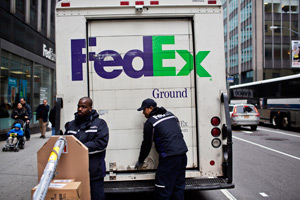FedEx Settles Contractor Suit for $228 Million

The company’s announcement involves litigation that is pending in the U.S. District Court for the Northern District of California. Plaintiffs in that case alleged that the workers at FedEx Ground were employees because of the extent of the company’s control over their activities.
“FedEx Ground faced a unique challenge in defending this case given the decision of the Ninth Circuit Court of Appeals last summer. This settlement resolves claims dating back to 2000 that concern a model FedEx Ground no longer operates,” said Christine P. Richards, executive vice president and general counsel of FedEx Corp.
“This is a historic settlement,” said Beth Ross, a California attorney who led counsel for the plaintiffs’ group, which includes about 2,000 people.
She told TT the amount of the settlement appears to be the largest in recent memory in U.S. employment cases. By comparison, she noted that U.S. Department of Labor collected a total of $264 million in 2013 in all employment cases pursued by the agency.
“It will absolutely be a precedent for other employment cases in the state.”
One potential area for such cases, she said, are port truck drivers. An estimated 10,000 drivers work in Southern California alone, with no more than 15% having employee status.
While FedEx has the resources to pay, smaller fleets in the ports are less likely to have money for a similar settlement, Ross said, which could prompt them to convert drivers to employee status.
The settlement, which hasn’t yet been filed, could be approved as early as July or August by the court. Funds could be disbursed as early as next year, she said, subject to the court’s schedule.
Because the plaintiffs worked for varying periods, there is no fixed amount each plaintiff could receive.
FedEx in August lost an employee/contractor case in the Ninth Circuit Court of Appeals. That appeals court reversed earlier rulings on the classification issue, deciding that independent contractors in California between 2000 and 2007 and in Oregon from 1999 through 2009 were employees, based on state law.
FedEx in 2011 changed the legal structure of its relationship with contractors at the unit. As a result, the workers are contractors to FedEx, and employees of the contracting business.
There are 25 certified class action suits involving FedEx Ground, the company disclosed in a Securities and Exchange Commission filing, as well as other suits and administrative proceedings on the issue.
The company has defeated classification change efforts in cases such as 20 multi-district cases heard in Indiana. A separate case is continuing in Kansas at the Appeals Court level.
“While we disagree with the court’s interpretation of California state law related to this case, we are pleased to put this matter behind us,” said a statement from FedEx spokesman Jess Bunn.
He told TT the company’s relationships with the businesses that employ Ground workers “will be further enhanced as we complete the transition to a new independent service provider agreement later this year.”
At the time of the August decision, FedEx noted that there have been more than 100 state and federal rulings that upheld the contractor status.
FedEx Ground has contracts with more than 550 businesses in California, with average revenue of $500,000, a statement by the Memphis, Tennessee-based company said.
There are more than 8,200 businesses that have contracts with FedEx in North America.
As a result of the settlement, FedEx said it will take a one-time, after-tax charge against earnings of $133 million, or 47 cents per share in its fiscal fourth quarter ended May 31. The charge is designed to increase the reserve to cover the cost of the settlement.
In addition, FedEx said it changed the way it calculates pension benefits to use an accounting system known as “mark to market.” The change won’t affect the amount of benefits for employees and retirees.
The pension accounting change resulted in a one-time, after-tax charge of $1.4 billion, or $4.88, in the fiscal fourth quarter.
FedEx, which ranks No. 2 on the Transport Topics Top 100 of the largest For-Hire Carriers in the U.S. and Canada, is scheduled to report earnings next week.
“Adopting the mark-to-market approach will align our accounting to provide greater transparency by removing certain legacy pension costs from segment operating results and recognizing them in a year-end adjustment,” said Chief Financial Officer Alan Graf in a statement.




